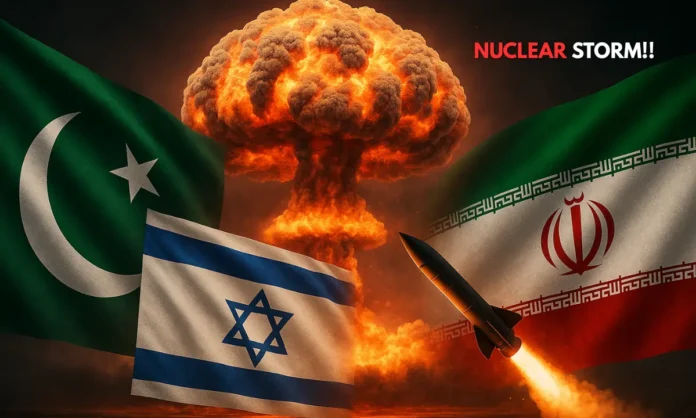SUMMARY
- A senior Iranian official claims Pakistan pledged nuclear retaliation if Israel nukes Tehran—Pakistan swiftly denied the statement.
- Pakistan’s Defence Minister has publicly backed Iran but clarified no nuclear commitment was made, highlighting risks of miscommunication in a volatile region.
- The Iran-Israel conflict has expanded beyond rhetoric into drone and missile exchanges, with nuclear fears raising alarms globally.
Nuclear Overtones in a Fractured Alliance
In the fraught chessboard of Middle Eastern geopolitics, the nuclear card has returned with terrifying prominence. As Israel and Iran exchange escalating strikes—ranging from missile barrages to targeted infrastructure hits—a controversial statement from an Iranian general has drawn Pakistan into the spotlight. On June 16, Mohsen Rezaei, a senior Islamic Revolutionary Guard Corps (IRGC) commander and National Security Council member, told Iranian state TV that Islamabad had warned it would launch nuclear missiles against Israel if Tehran were attacked with nuclear weapons.
This stunning claim came without public corroboration from Pakistani officials. Within hours, Pakistan’s Defence Minister Khawaja Asif dismissed the statement outright. Yet the ambiguity lingered, raising urgent questions: Was this a miscommunication? A deliberate signal? Or a fabricated claim meant to reshape regional narratives?
The backdrop is anything but benign. Since Israel launched “Operation Rising Lion” against Iran’s nuclear facilities on June 13—killing several senior Iranian scientists and military figures—Iran has retaliated with “Operation True Promise 3”, sending drones and missiles across Israeli airspace. More than 230 have died in Iran, with 18 reported casualties in Israel. It’s the most open military confrontation between the two adversaries in decades, and Pakistan’s role—real or perceived—could tip diplomatic balances in unprecedented ways.
Big Breaking
— Yanika_Lit (@LogicLitLatte) June 15, 2025
Pakistan said “if Israel drops a nuclear bomb in Tehran, we will drop a nuclear bomb on them.” – Iranian National Security Council member Mohsen Rezaei
Israel also faces a nuclear threat from Pakistan.
Both Iran and Pakistan should be denuclearized. pic.twitter.com/HmuFTVDIJB
A Strategic Denial or Tactical Ambiguity?
- Iran’s claim drew immediate global media attention; Pakistan officially denied it within hours.
- Defence Minister Khawaja Asif reaffirmed support for Iran but denied any nuclear pledge.
- Islamabad’s closure of its Iran border suggests concern over military spillover.
The Iranian claim was explosive—literally and diplomatically. According to Turkiye Today, Rezaei asserted that Islamabad had conveyed its readiness to strike Israel with nuclear weapons if Tehran was nuked. The claim was not repeated by any Pakistani official, nor was it reported in any verified diplomatic communication.
Pakistan’s Defence Minister Khawaja Asif responded in Parliament, urging Muslim nations to unite against Israel, which he accused of attacking not only Iran but also Yemen and Palestine. However, he firmly denied that Pakistan had made any nuclear commitment. “We stand behind Iran and will support them at every international forum to protect their interests,” he said, emphasizing diplomatic solidarity but stopping short of endorsing military action.
Despite the denial, some analysts argue that the statement—whether true or false—may have been designed to test international reaction or to pressure Muslim nations into forming a unified stance. Others view it as a classic example of regional disinformation aimed at shifting narratives during wartime.
Growing Dangers of Escalation and Misinterpretation
- Israel’s missile strikes targeted Iran’s Quds Force and uranium enrichment sites.
- Iran responded with ballistic missile volleys, hitting Tel Aviv and Jerusalem outskirts.
- The war rhetoric now includes nuclear threats from multiple directions—intentional or not.
At the heart of this crisis lies a dangerous truth: the risk of misunderstanding in nuclear diplomacy is often as lethal as the weapons themselves. With Pakistan’s long-standing nuclear capability and its complex history with Israel (which it does not recognize), even an unverified statement can ignite strategic anxiety across capitals.
Tehran’s claim adds fuel to an already combustible equation. If any nation signals willingness to enter a nuclear theatre—whether defensively or as a show of deterrence—global alarms go off. Israel’s Defence Minister Israel Katz had already warned Iran that “Tehran residents will pay the price” for missile attacks. Although later clarified to mean regime targets, such language walks the edge of nuclear ambiguity.
Meanwhile, visuals of destroyed buildings in Tel Aviv and reports of Iranian drones penetrating Israeli airspace add a visceral dimension to the strategic threats. The humanitarian cost is mounting, and the international community is struggling to contain both narrative warfare and literal missile launches.
A Tectonic Moment in Muslim World Diplomacy?
- Pakistan has called for the Organisation of Islamic Cooperation to unite against Israel.
- Iran’s response to Israeli strikes remains relentless and ideologically driven.
- Regional powers must now reckon with rising nuclear rhetoric, even if symbolic.
Beyond military maneuvers, the realignment of political alliances is underway. Pakistan, long caught between Saudi-led Gulf interests and deep-rooted ties with Iran, now finds itself in a position of unexpected influence. Asif’s statements about Muslim unity and calls for an emergency OIC session underscore Islamabad’s attempt to balance symbolism and statecraft.
Whether Pakistan actually pledged nuclear retaliation may matter less than how the world perceives it. In a digital age of viral claims and geopolitical brinksmanship, the damage of even a hypothetical nuclear alignment can ripple far wider than the battlefield.
Fallout Diplomacy: The Real Cost of Unspoken Red Lines
The Iran-Israel conflict is no longer confined to covert operations or shadow wars. It’s becoming a high-stakes theatre where misinformation, misinterpretation, and machismo collide. Pakistan’s role—denied or otherwise—illustrates just how delicate regional balances are, especially when nuclear stakes are whispered in wartime chaos.
For now, Israel and Iran continue trading blows. But the real danger may lie in what is said behind closed doors—or claimed in front of microphones.
As one regional analyst noted, “Nuclear threats don’t have to be real to be effective. They just have to be believed.”


